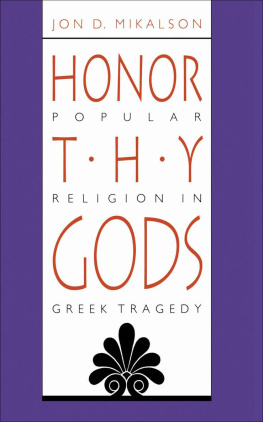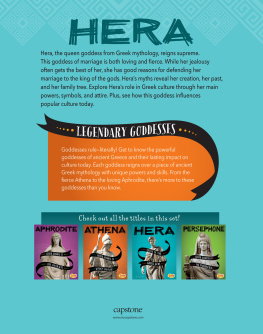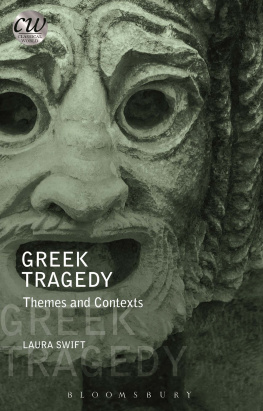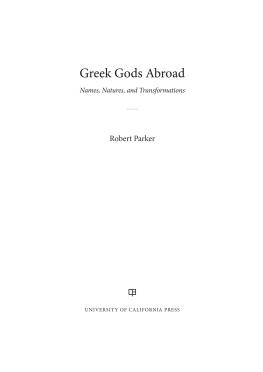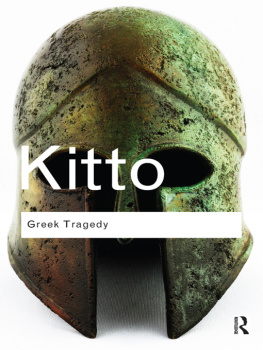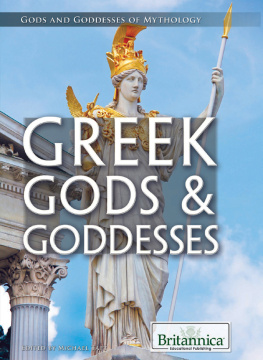1991 The University of North Carolina Press
All rights reserved
Manufactured in the United States of America
The paper in this book meets the guidelines for permanence and durability of the Committee on Production Guidelines for Book Longevity of the Council on Library Resources.
95 94 93 92 91 5 4 3 2 1
Library of Congress Cataloging-in-Publication Data
Mikalson, Jon D., 1943-
Honor thy gods : popular religion in Greek tragedy/Jon D. Mikalson.
p. cm.
Includes bibliographical references and index.
ISBN-13: 978-0-8078-2005-6 (alk. paper)
ISBN-10: 0-8078-2005-9 (alk. paper)
ISBN-13: 978-0-8078-4348-2 (pbk.: alk. paper)
ISBN-10: 0-8078-4348-2 (pbk.: alk. paper)
1. Greek drama (Tragedy)History and criticism. 2. Gods, Greek, in literature. 3. Religion in literature. I. Title.
PA3136.M54 1991 91-50282
CIP
Preface
The religion found in Greek tragedy is, like the language of Homer, a complex hybrid, a hothouse plant which never did and probably never could exist or survive in real life. Although the components of the hybrid are heterogeneous, they have been fused so expertly by the genius of the poets that the original distinctions between them are seldom apparent. At the risk of considerable oversimplification, we may designate as major components of religion in tragedy (1) the anthropomorphic deities of the Homeric pantheon; (2) beliefs and deities once part of popular religion but in the classical period virtually extinct; (3) deities, beliefs, practices, and cults of contemporary fifth-century society; (4) a concern with the morality and justice of the gods; and, finally, (5) contemporary or recent philosophical conceptions of deity. In varying degrees each element has itself influenced or been influenced by others, and traces of one can usually be found in another. Despite this, each has, for purposes of analysis, a fairly distinct character, and taken together they provide a context for understanding religion in tragedy in relation both to the beliefs and practices of the audience and to its uses as a vehicle of literary expression.
To further complicate the situation, this potpourri of beliefs, cults, deities, and myths is set in a legendary period, within a generation or two of the Trojan War, a dramatic time when gods and rituals are often in the process of becoming what was familiar to the fifth-century audience. Often the gods themselves are changing and new cults are being introduced. Several tragedies dramatize the very moments when gods, heroes, cults, and rituals are transformed from what the poet imagined them to be in a legendary past to the form that was familiar to the audience of the fifth century.
Attention to religion in tragedies has centered almost entirely upon the behavior of gods and upon the poets and modern critics evaluation of that behavior. On stage and off, gods do or do not speak or intervene in certain situations, and modern critics discuss at great length whether such behavior is moral or immoral by the standards of the critic, of the playwright, and of the fifth-century audience. The poet is judged to be religious and pious if he represents his deities as just and moral. Some deities of tragedy behave in ways which are, to say the least, problematic for a moralizing critic, and as a result their creator is, depending on the preferences of the critic, praised or damned for being a godless detractor of traditional religion. The underlying premises of such discussions of religion in tragedy are (i) that Olympian deities like Zeus, Apollo, Aphrodite, and Poseidon, as they are depicted in tragedy, were believed in and worshiped by fifth-century Athenians, and (2) that ordinary Athenians of the time included among their religious concerns the expectation that gods be just with a justice similar or identical to that expected among men. Both assumptions are open to grave doubt and require, at the least, examination in terms of what we know of fifth-century religion.
There are, however, many more elements of religion, and many elements perhaps more religious in Greek tragedy than the anthropomorphized Olympian deities whose virtues and vices the critics have meticulously weighed. My interest is the religious beliefs and attitudes of ordinary Athenians of the classical period. These are the beliefs about which they spoke and upon which they acted in daily life. In Athenian Popular Religion I collected a corpus of these beliefs as they were expressed in orators, historians, and inscriptions of the late fifth and fourth centuries B.C. The result was a set of beliefs, usually expressed casually, briefly, and starkly, beliefs for which an Athenian speaker or writer expected general acceptance among his audience. When we find similar beliefs expressed in the tragedies, we are now able to identify them, with some justification and confidence, as beliefs commonly held by the audience of tragedy. From the orators, inscriptions, and Xenophon we have the skeletal structure of this system of beliefs. Tragedies afford the possibility of adding flesh to this skeleton, because there characters in lifelike situations express these beliefs, talk of the reasons behind them, and act upon or against them.
In the plays many characters act with what would be, by the criteria of popular religion, exemplary piety or impiety. Occasionally these matters are the focus of an entire play; more often they arise only incidentally to the main action. But even short scenes allow us to discover considerably more about the nature of popular beliefs and the rationale behind them. We may know, for example, from the offhand comment of an orator or historian that it was impious to violate the rights of asylum, but when a dramatist places on stage suppliants pleading with a king to protect such rights, the abstract belief is brought to life. We hear arguments and issues, religious and other, that may be involved in such a situation. The belief, mise en scne, is given flesh and blood.
In addition, since we have knowledge of these beliefs independently from the poetic tradition, we can often isolate instances in which tragedians, individually or as a group, refashioned popular elements so as to make them something different from that commonly believed and practised by their audiences. It is at this point that we must return to the hybrid character of religion in Greek tragedy, because when a popular belief is remodeled or recast, it is usually done so under the influence of one of the other elements of that hybrid.
I consistently speak of religion in Greek tragedy and not of the religion of tragedy, because the individual dramatists employ religion in such very different ways. Aeschylus, Sophocles, and Euripides put different emphases and interpretations on religious aspects of, for example, perjury and asylum, matters which we know were of religious concern to their audiences. Often the three tragedians present beliefs and practices in just the form and context in which we find them in popular religion. When, however, they vary or refashion these popular beliefs, they may be drawing from quite different elements of the hybrid of tragic religion.
There has been an enduring interest, since antiquity, to rank the tragedians, to find the most religious, the least religious, and so forth. This quest, focusing as it has on only the treatment of the deities, has been, in terms of the practised religion of the period, misleading. Should we grant that such ranking has merit, the scores will vary considerably depending on whether we look at the behavior of the anthropomorphic gods, the presentation of the myths, the philosophical and theological theories introduced, or the popular religious beliefs expressed. For this last, my primary interest, we now are able to investigate whether a poet, in assigning rewards and punishments to characters who act, by contemporary standards, piously or impiously, is in accord with the beliefs of his audience. Consistent accord would suggest that the poet accepted, supported, and even promoted conventional religious beliefs, whereas frequent disagreement would indicate dissatisfaction and attempts at reform.

